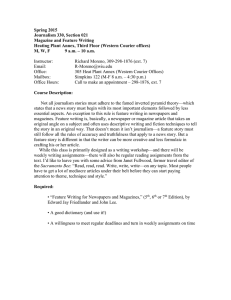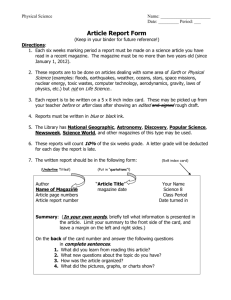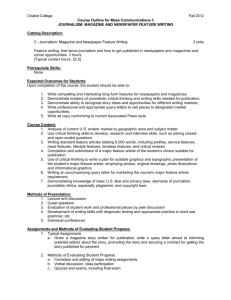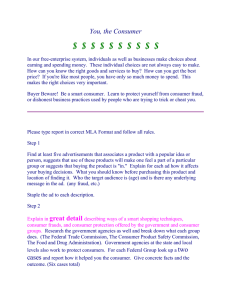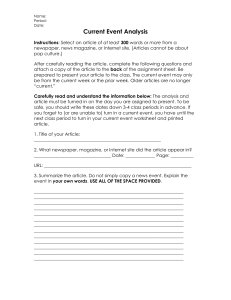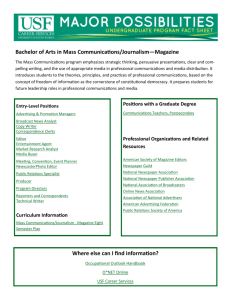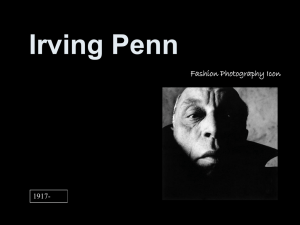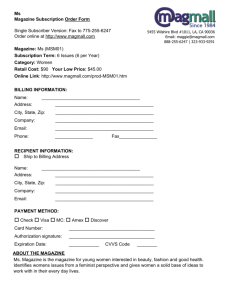Spring 2015 Journalism 333, section 021 Special Press: Magazine Content & Design
advertisement
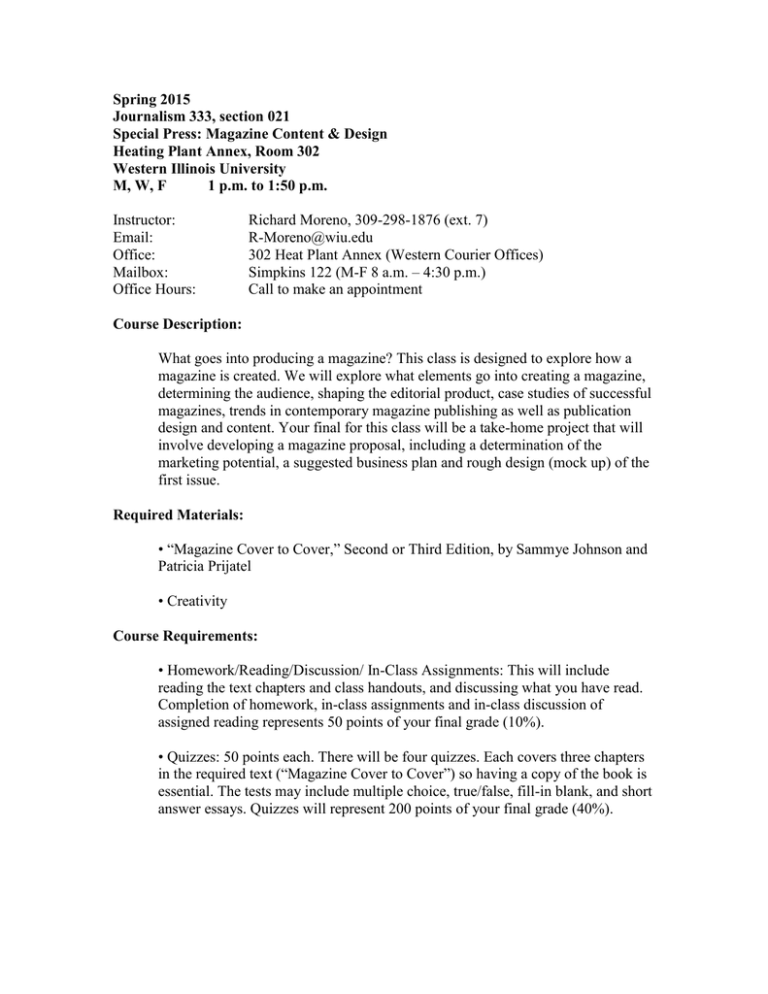
Spring 2015 Journalism 333, section 021 Special Press: Magazine Content & Design Heating Plant Annex, Room 302 Western Illinois University M, W, F 1 p.m. to 1:50 p.m. Instructor: Email: Office: Mailbox: Office Hours: Richard Moreno, 309-298-1876 (ext. 7) R-Moreno@wiu.edu 302 Heat Plant Annex (Western Courier Offices) Simpkins 122 (M-F 8 a.m. – 4:30 p.m.) Call to make an appointment Course Description: What goes into producing a magazine? This class is designed to explore how a magazine is created. We will explore what elements go into creating a magazine, determining the audience, shaping the editorial product, case studies of successful magazines, trends in contemporary magazine publishing as well as publication design and content. Your final for this class will be a take-home project that will involve developing a magazine proposal, including a determination of the marketing potential, a suggested business plan and rough design (mock up) of the first issue. Required Materials: • “Magazine Cover to Cover,” Second or Third Edition, by Sammye Johnson and Patricia Prijatel • Creativity Course Requirements: • Homework/Reading/Discussion/ In-Class Assignments: This will include reading the text chapters and class handouts, and discussing what you have read. Completion of homework, in-class assignments and in-class discussion of assigned reading represents 50 points of your final grade (10%). • Quizzes: 50 points each. There will be four quizzes. Each covers three chapters in the required text (“Magazine Cover to Cover”) so having a copy of the book is essential. The tests may include multiple choice, true/false, fill-in blank, and short answer essays. Quizzes will represent 200 points of your final grade (40%). • Cover Story/Feature Store: Since you will be creating your own publication concept, you will be asked to write a 1,200 to 1,500-word (approximate) feature story that will serve as the cover story for the mock-up of your magazine. This story must relate to the overall theme of the magazine you are creating. The paper will represent 100 points of your final grade (20%). • Final Project: Developing and Designing Your Own Magazine. This will include preparing a 10- to 14-page mock up of your own magazine. This is your vision for your own publication—what is its name and subject matter? What is its purpose? What basic design ideas do you have for this publication? You must include its logo (name of your publication), the cover, a table of contents page, a main feature story layout and a sample department or column. The final project will represent 125 points of your final grade (25%). • Attendance and Class Participation: It will be extremely difficult to pass this course if you do not attend the classes and participate. Role will be taken regularly. 5 points will be deducted for every unexcused absence. • There will be a total of 500 points available for this class. Grades will be calculated by percentage using the following scale: A 92 percent or above A- 89-91 percent B+ 86-88 percent B 82-85 percent B- 79-81 percent C+ 76-78 percent C 72-75 percent C- 69-71 percent D+ 66-68 percent D 62-65 percent D- 59-61 percent F 58 percent or less 460 points or above 445-459 430-444 410-429 395-409 380-394 360-379 345-359 330-344 310-329 295-309 290 or below Class Logistics Class begins promptly at 1 p.m. on Monday, Wednesday and Friday and will conclude at 1:50 p.m. Please be on time and be prepared. Read what has been assigned and complete any homework reading assignments prior to class. Please remember to turn-off your cell phones during class. Additionally: 1. Attendance–Attend class. Attendance will be recorded and it can affect your grade. To have an excused absence, you must provide me with an explanation in writing (or via email) within one week of the missed class. 2. Assignments—Late assignments will not be accepted. If a scheduled competition or performance conflicts with a class deadline, it is your responsibility to turn in your work before—not after—the due date. If you contact me after missing an assignment, do not expect to receive credit for the assignment. Only prompt written explanations signed by valid authorities will be considered valid. 3. Decorum—Students will respect each other (constructive criticism and enthusiasm are fine but rudeness and antagonism are unacceptable). Use respectful classroom etiquette toward both the instructor and your classmates. 4. Cheating and Plagiarism—Plagiarism will not be tolerated in this course. Any student caught plagiarizing will receive an automatic “0” on that assignment. Plagiarism is defined as the use of another’s ideas, data, and statements with little or no acknowledgement. Additionally, it is not acceptable to turn-in an assignment completed for another course. For more details, please read the “Academic Integrity” policy at www.wiu.edu/provost/student. Other Useful Resources: University Writing Center, SI 341 Simpkins Hall, Room 341 Open Monday-Friday 9 a.m. to 4 p.m., plus Wednesdays 6 p.m. to 9 p.m. Appointments preferred: 298-2815 Assistance Students with special learning needs requiring pedagogical accommodation should let me know as soon as possible. The University’s policy is that, in accordance with the Americans with Disabilities Act, academic accommodations may be made for any student who notifies the instructor of the need for an accommodation. It is imperative that the student takes the initiative to bring such needs to the instructor’s attention, as he is not legally permitted to inquire about such particular needs of students. Students who may require special assistance in emergency evacuations (i.e. fire, tornado, etc.) should contact the instructor as to the most appropriate procedures to follow in such an emergency. Contact Disability Support Services at 298-2512 for additional services. Web address for student rights & responsibilities: (http://www.wiu.edu/provost/students.php) Web address for Academic Integrity Policy: (http://www.wiu.edu/policies/acintegrity.php) About the Instructor I am the Adviser to the Western Courier and Director of Student Publications. If you’re a Journalism major/minor (or even if you’re not), you should think seriously about writing for the Courier. I also serve as the Adviser to Western Illinois Magazine, a student-run twice-annual general interest magazine. You should be working for one or the other if you are serious about writing. Prior to coming to Western in 2006, I worked for more than 14 years as the Publisher/Editor of Nevada Magazine, a bimonthly travel and tourism publication. From 2004 to 2006, I taught Travel Writing at the Donald Reynolds School of Journalism at the University of Nevada, Reno. Additional Background: • I am the author of thirteen non-fiction travel and/or history books including “The Roadside History of Nevada,” “Myths and Mysteries of Illinois” and “Illinois Curiosities.” My next book, “A Short History of Reno, Nevada,” will be published in the fall of 2015. • In 2007, I was honored with the Nevada Writers Hall of Fame “Silver Pen Award.” • From 1985 to 1992, I was Director of Advertising and Public Relations for the Nevada Commission on Tourism and created the “I Survived Highway 50, the Loneliest Road in America” promotion, which was awarded best state tourism public relations campaign by the National Council of State Travel Directors. • From 1980 to 1985, I worked as a reporter at several newspapers including the Reno Gazette-Journal, the Davis Enterprise and the Montclarion in Oakland. Calif. I also wrote a travel-history column for more than two decades for several Nevada newspapers. • I have a master’s degree (M.S). in journalism from Columbia University’s Graduate School of Journalism in New York and an undergraduate degree in political science from the University of California at Davis.
